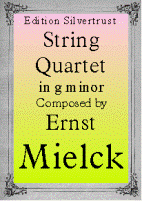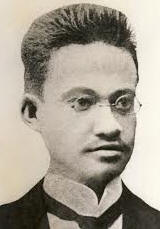Presents
Ernst Mielck
 |
 |
Soundbites courtesy of Steve Jones |
String Quartet in g minor, Op.1
"To Whom it May Concern: This is to certify that Ernst Mielck of Vyborg, Finland, has been my private pupil from October 1895 to May 1896. Under my direction he addressed himself to score reading, exercises in the art of orchestration, and the detailed formal analysis of the works of the masters, demonstrating a profound understanding. With my guidance he wrote a String Quartet which showed him to be in possession of an easy, felicitous, and remarkable flair for invention, and an ever-increasing and most pleasing understanding of the essence and the inherent aims and purposes of instrumental music. He was for me an exceptionally dear pupil, who has through his unquestionable talent and the greatest diligence - brought me nothing but joy and who, should he continue to develop in the same vein, must inspire the greatest hopes for the future."---Max Bruch
Ernst Mielck (1877-1899) was born in the Finnish (now Russian) province of Karelia in the town of Viipuni (Vyborg). His father's family were merchants and had emigrated from Germany. After studying piano locally, he continued his studies in Berlin both at the Stern Conservatory with Robert Radecke and privately with Max Bruch. Always in poor health, he died young of tuberculosis but not before composing a symphony, a string quintet and a string quartet all of which which were premiered to critical acclaim.
Mielck's early death was no doubt responsible for neglect his work has suffered. When you listen to the soundbites from this quartet, composed when Mielck was 18, one can understand Bruch's great enthusiasm. Here is a polished mature work, which was good enough to receive publication shortly after its premiere. The opening movement, Allegro energico, has a driving theme for its main subject, followed by a sad but lovely, lyrical second melody. The second movement, Allegretto, is a cross between an intermezzo and romanza. The a lovely, highly romantic melody in the violin is charmingly accompanied by pizzicati and soft chords in the other voices. The Adagio cantabile which follows is a deeply felt movement based on a Finnish folk melody. The opening to the finale, Vivace, is dominated by a questioning rhythmic motif, which is cleverly expanded in a type of rondo dance.
Never reprinted and all but lost, we are very pleased to reintroduce this fine work which will not only greatly appeal to amateurs looking for a fresh work but also to professionals who wish to perform a Finnish work from the Romantic era.
Parts: $24.95